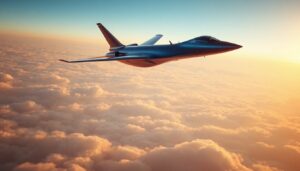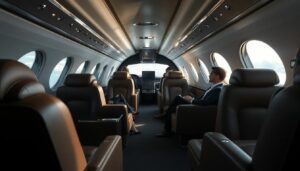Introduction
Imagine soaring high in the sky and skipping the busy terminals. With it, long-range private jet travel opens up a worldwide schedule toward one’s destination. As much as these luxuries come at a hefty price, all the expenses that come with owning a long-range jet have been segmented in this article. The guide enlightens potential future owners on the financial commitment involved.
Initial Acquisition Costs of Long Range Jets
There are a number of different factors on which the price of a long-range jet depends. Is it brand new or used? New jets are likely to come with all possible technological advancements today, while a pre-owned jet might save you a ton of money. Both have benefits and disadvantages. Customization significantly affects the final cost.
Prices for New Long Distance Jets
New long range jets can range in price from $40 million to more than $100 million. One of the examples is the Gulfstream G650ER, which averages about $75 million, or even higher is Bombardier’s Global 7500. The expense incurred indicates the standards of advanced technology and luxurious interiors.
Pre-Owned Market Considerations
A significant amount can be saved by the purchase of a used jet. Depreciation is very severe on the new jets. The above condition was already met for old used jets. But be careful!! Maintenance records should be checked meticulously. A thorough inspection is required. Older jets tend to require more repairs.
Customization and Upgrades
The cost of personalizing your jet can be increased by millions. The most expensive interiors attract people. It could not be possible without an advanced avionics system to secure oneself. With a custom paint job, a person can easily make an impression. So better work with renowned designers in order to set the budget properly.
Operational Expenses: The Recurring Costs of Long Range Jet Ownership
Again, owning a long-range jet implies recurrent costs of expenses. Budgeting is a critical process for all these expenses, as they accumulate at a fast rate.
Fuel Cost
Fuel. Fuel is the next major cost and one of the biggests cost components of long-range jets; it depends on the model of the jet and the distance flown. Cost thousands of dollars per flight, At the airport indirect jet-A fuel prices are not constant.
Maintenance and Inspections
The safety of your jet relies on proper maintenance and inspections. Scheduled inspections are compulsory, and all unscheduled repairs can be very costly. Select a certified maintenance facility. A good facility will catch problems before they get bigger and more expensive.
Crew Salaries and Training
Competitive remuneration is allied to pilots, flight attendants, and mechanics. Safety is the top priority. Continuing workforce education brings additional costs. The big investment would return more profits with an experienced crew.
Fixed Costs: The Inexorable Costs of Owning a Jet
Even when your jet is sitting on the ground, some of these fixed costs go on. Those fixed will include storing your aircraft, insurance, and salaries for the crew. Thus, the understanding of these aspects helps in budgeting.
Hangar Fees and Insurance
Hangar charges cover the storage of aircraft. Fees depend on the location. Liability insurance is mandatory. Comprehensive coverage makes sense. Both make sure that an asset is well protected along with the protective measures.
Pilot Salaries
Pilot salaries cost a pretty penny. Even when you’re not flying, paid pilots still cost money. Skilled pilots are essential to retain. The catch, of course, is that they usually cost more.
Depreciation
As time loves, jets sink in their dollar value. This is called depreciation. Resale value gets affected by it. Accounting aspect matters for personal finance. A proper understanding depreciation helps in investment tracking.
Other Ownership Models Complementary to Reduced Cost Long Range Jets
Full ownership is no longer the only answer to this particular concern. Alternatives such as fractional ownership and jet cards provide solutions. These lessen financial strains considerably.
Fractional Ownership
This model allows fractional ownership: the buyer buys a share of the jet. Owners are multiple and share the expenses of the aircraft. This is cheaper than having your own jet and has less management hassles.
Jet Cards and Charters
Jet cards give access to jets without having an ownership. You pay upfront hours to fly on these jets. Charter services are “on-demand” flights. Both are good for the occasional flyer.
Financing Options and Tax Implications for Long Range Jets
Financing and taxes will matter in the purchase of the jet. Learn about loans. Know what taxes could work for you.
Aircraft Loans and Leasing
Loans on aircraft help finance the purchase. Otherwise, you can look into leasing. Compare interest and term. Choose the one that is most advantageous for your scenario.
Tax Deductions and Depreciation
Some of the businesses may also obtain tax deductions. Depreciation would reduce your tax bill. Consult with a tax advisor. They will help you maximize saving.
Making an Informed Decision: Long Range Jet Cost Considerations
Buying a long-range jet is a huge matter. There has to be a very careful approach to planning. Expert advice would be in great consideration.
Thorough Cost Analysis
Detailed and forensic analysis of costs. All costs should be factored in. Ongoing costs should not be underestimated. This works to avoid being caught off guard financially.
Expert Consultation
Talk to professionals in aviation. Brokers and consultants can give advice on this. The value of their expertise in such matters cannot be overemphasized. They guide you through these processes.
Conclusion
Long range jets are investments. This translates into a significant investment. Fuel, maintenance, and crewing costs can skyrocket. Careful planning and budgeting are essential. Seek professional advice and conduct thorough research. Weigh all costs before making your decision. Then, you can enjoy the benefits of private jet travel.



